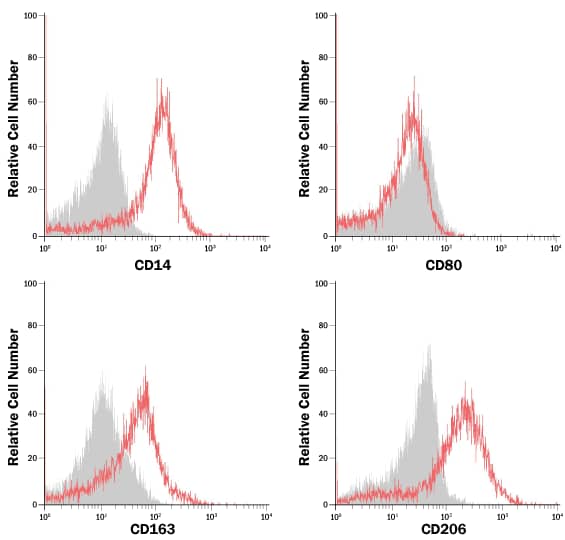Macrophage Differentiation Kits: Cell Culture Products
Macrophages are myeloid antigen-presenting cells (APC) that differentiate from monocytes. They can localize to specific tissues and can adopt distinct phenotypes depending on stimulating factors. Macrophages internalize extracellular antigens for processing and loading onto MHC class II molecules in late endocytic compartments. Antigen/MHC II complexes associate with costimulatory B7 family members for presentation to T cells.
Differentiation of classically activated macrophages requires initial exposure to IFN-gamma. Primed macrophages become activated by subsequent encounter with stimuli such as bacterial LPS. Classically activated macrophages exhibit a Th1-like phenotype, promoting inflammation, extracellular matrix (ECM) destruction, and apoptosis. Differentiation of alternatively activated macrophages is induced by IL-4 and/or IL-13. These macrophages exhibit a Th2-like phenotype, promoting wound repair, fibrosis, proliferation, angiogenesis, and the resolution of inflammation. Alternatively, activated macrophages are also implicated in the development of allergy and asthma.
2 results for "Macrophage Differentiation Kits Cell Culture Products" in Products
2 results for "Macrophage Differentiation Kits Cell Culture Products" in Products
Macrophage Differentiation Kits: Cell Culture Products
Macrophages are myeloid antigen-presenting cells (APC) that differentiate from monocytes. They can localize to specific tissues and can adopt distinct phenotypes depending on stimulating factors. Macrophages internalize extracellular antigens for processing and loading onto MHC class II molecules in late endocytic compartments. Antigen/MHC II complexes associate with costimulatory B7 family members for presentation to T cells.
Differentiation of classically activated macrophages requires initial exposure to IFN-gamma. Primed macrophages become activated by subsequent encounter with stimuli such as bacterial LPS. Classically activated macrophages exhibit a Th1-like phenotype, promoting inflammation, extracellular matrix (ECM) destruction, and apoptosis. Differentiation of alternatively activated macrophages is induced by IL-4 and/or IL-13. These macrophages exhibit a Th2-like phenotype, promoting wound repair, fibrosis, proliferation, angiogenesis, and the resolution of inflammation. Alternatively, activated macrophages are also implicated in the development of allergy and asthma.
For the differentiation of human CD14+ monocytes into M1 macrophages
For the differentiation of human CD14+ monocytes into M2 macrophages.


